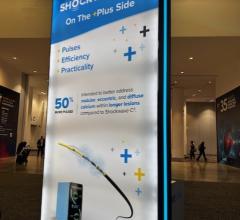
The antiplatelet Plavix (clopidogrel). GettyImages
November 9, 2021 — Utilizing a magnetically-controlled capsule endoscopy system, the double-blind, randomized OPT-PEACE trial found that nearly all patients receiving antiplatelet therapy developed evidence of abnormal gastrointestinal (GI) mucosal findings on capsule endoscopy. Dual antiplatelet therapy (DAPT) followed by single anti-platelet therapy (SAPT) led to less GI injury than continued DAPT.
Findings were reported today at TCT 2021, the 33rd annual scientific symposium of the Cardiovascular Research Foundation (CRF). TCT is the world’s premier educational meeting specializing in interventional cardiovascular medicine. The study was also published simultaneously in the Journal of the American College of Cardiology.[1]
GI bleeding is the most frequent major complication of antiplatelet therapy, but little is known regarding the predisposition to GI injury that occur with different antiplatelet regimens. In addition, the use of standard endoscopy in patients on antiplatelet therapy is limited due to risks such as bleeding. In the OPT-PEACE trial, investigators utilized a non-invasive magnetically-controlled capsule endoscopy system that does not require discontinuation of antiplatelet therapy and has comparable accuracy to standard upper GI endoscopy. To determine the incidence and types of GI mucosal injuries in patients receiving SAPT or DAPT, repeated capsule endoscopy exams were performed at baseline, six months, and 12 months.
Between July 13, 2017, and July 13, 2019, 783 eligible patients at low risk for bleeding were enrolled following percutaneous coronary intervention (PCI) and six months of DAPT. After a second capsule endoscopy, 505 event-free patients without GI ulceration or bleeding at both baseline and six months were randomized to aspirin plus placebo (n=168), clopidogrel plus placebo (n=169) or aspirin plus clopidogrel (n=168) for an additional six months at 28 Chinese centers. A total of 2,050 successful capsule endoscopy exams were performed during the study.
The primary endpoint was the incidence of gastric or small intestinal mucosal injury (erosion, ulceration, or bleeding) detected either by capsule endoscopy at six or 12 months or at any clinically-driven standard endoscopy. The study found that GI mucosal injury through one year was less with SAPT compared with DAPT (94.3% versus 99.2%, p=0.02). Ulcers were observed in 14.4% of patients on SAPT and 18.5% DAPT (p=0.30). Among 68 patients without any GI injury at randomization (including no erosions), SAPT was associated with less GI injury (68.1% vs. 95.2%, p=0.01), including fewer new ulcers (8.5% vs. 38.1%, p=0.006), than DAPT. In addition, clinical GI bleeding between six and 12 months was less with SAPT compared with DAPT (0.6% versus 5.4%, p=0.001).
“The use of a novel magnetically-controlled capsule endoscopy system showed that nearly all low bleeding risk patients developed gastrointestinal injury during 12-month follow-up after PCI regardless of antiplatelet regimen,” said Yaling Han, M.D., from the General Hospital of Northern Theater Command in Shenyang, China. “However, DAPT followed by SAPT resulted in less gastrointestinal mucosal injury and clinical bleeding. These findings are valuable for clinical decision-making on gastroprophylaxis and optimizing antiplatelet therapy type and duration.”
The study was funded by the China National Key R&D Project and an investigator-initiated grant by Ankon Medical Technologies (Shanghai, China). Han reported no disclosures.
Links to All the TCT 2021 Late-Breaking Clinical Trials
More antiplatelet technology news
Reference:


 October 31, 2025
October 31, 2025 









